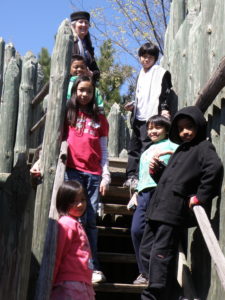
Pay attention, make your interpretation relevant to their world!
There I was, about half way through my tour. I was full steam ahead into my explanation of the clerk’s role in the fur trade. A great bunch of kids . . . fourth graders, lively and inquisitive. I was on a roll.
Then, BAM! I got smacked face-on by Freeman Tilden’s first principle* of interpretation . . .
Any interpretation that does not somehow relate what is being displayed or described to something within the personality or experience of the visitor will be sterile.
I was mid-sentence. The teacher asked if she could interrupt. I stopped and sputtered, while she announced to her students, “Remember when we were studying Hamilton? Remember how he got a job as a clerk when his mother died? He did the same job as this man . . . “
The students all nodded in understanding. That teacher had obviously shared her experience with Hamilton: An American Musical, maybe when teaching about the American revolution. Because of her interpretation, not mine, her students understood the role of a clerk in a trading house better than many adults on my tours.

My friend Lisa, talking a selfie just before we saw Hamilton on Broadway, a year ago January, her for the third or fourth time.
Now maybe you’ve been under a rock since 2015, but you must have at least heard of that musical. It’s brilliant, for so many reasons and on so many levels. But that’s not my point.
Back to my tour. Luckily, I managed to squeeze in a “wow” or two and reinforce the teacher’s conclusion. But I still “threw away my shot.” I completely missed my chance to relate my interpretation of the fur trade to the experience of those young people. I completely ignored Tilden’s first principle. I ignored the history of the students in my tour group. And at the same time, I made my story sterile.
The moral of this story? Regardless of your opinion about Hamilton, pay attention to what young people are passionate about. Read, or at least try to read, what they read. Watch what they watch. Listen to what they listen to.
You don’t have to understand or share their opinions, but you should know what rocks their world, whether rock musicals, video games or school shootings. Pay attention. Look for connections between your world and theirs. Talk to students not at them.
Follow Tilden’s lead. Relate what you’re displaying or describing to something within the personality or experience of your listeners. And let me know if you want to join me in the rush line for Hamilton tickets when it comes to Minneapolis next season.
* Freeman Tilden. Interpreting Our Heritage, The University of North Carolina Press, 1957. (4th edition, November 2009)


Great advice, thank you Jacki! I would love to go when Hamilton is here next season. Words of wisdom.